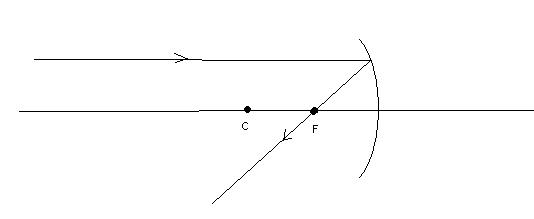Edit:- Man is standing to the right of the pole.
1)Why the speed of the image on an object moving with constant speed increases as it moves nearer and nearer to a stationary mirror?
2)How to make use of sign convention in ray optics while solving numericals?
-
UP 0 DOWN 0 1 23

23 Answers
khyati, i want to ask u a q. Dat if u had studied coordinate geometry or nt?
i am not able to know where the man is standing at 4m to the right of pole or to the left of pole or w.r.t mirror....
One more question,
A pole of height 4m is kept in front of a vertical plane mirror of length 2m. The lower end of the mirror is at height of 6m from the ground. The horizontal distance between the mirror and the pole is 2 m. Upto what minimum and maximum height a man can see the image of top of the pole at a distance of 4m standing on the same horizontal line which is passing through the pole and the horizontal point below the mirror?
ur answer is right.....
and i also obtained........'
if we rotate the plane mirror by some angle @, then by what angle reflected ray will rotated by angle?
A long room is there, a person standing exactly in the middle of the room, he has to view the image of the rear wall on the mirror placed on the front wall, if the height of rear wall is h m, what should be the length of the mirror?
Thanks Aashish and Harrys.[1]
@ Sahil, I have not done coordinate geometry (found it boring,so will do it later)[3]
1) which type of mirror u r asking about?
2) use any basic book.....all the sign conventions are written ......
1) v0 = (vu)2u0 where v0 = speed of image and u0= speed of object
v and u are dist of image and object respectively.
it clears that as dis t of object decreases speed of image increases
velocity of image in concave & convex mirror is given by
-[v/u]2 multiplied by velocity of object.
Now in case of convex mirror,
v is approx. constant as for any decrease in u .
So, speed of the image on an object moving with constant speed increases as it moves nearer and nearer to a stationary mirror.
the answer of ist q. is simple,,,, u know that mirror equation.... in that the image distance an d the object distance is not linear ,hence speeds are different.
if object, image and focus are on that side of mirror from which rays are coming take -ve otherwise +ve
i.e take that -ve which is on that side of mirror from which rays are comingand take that +ve whichis at other side
eg.
in that case take focus -ve becoz ray is coming from left of mirror and focus is also on left of mirror
convex mirror used in the rear view o the cars and other vehicles.
@Nihal, sign conventions pata hai, but while doing sums I don't know when to take u , v and f positive or negative. If you have NCERT, then see solved example 9.3 (page no. 315) and solved example 9.4(pge no. 316), in one they have taken f -ve and in the other one +ve, wohi confusion hai. I am stupid, I might be making some mistake so please try to make me understand.
in plane mirror, speed of object = speed of image for stationary mirror....
1) Plane mirror mein toh it remains constant (thogh twice the speed pf object)...